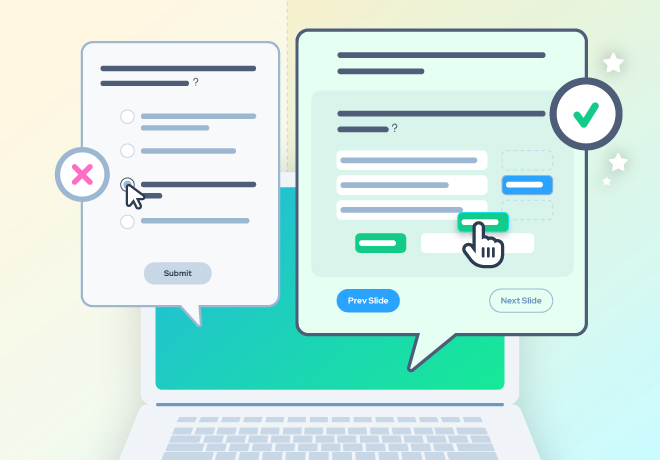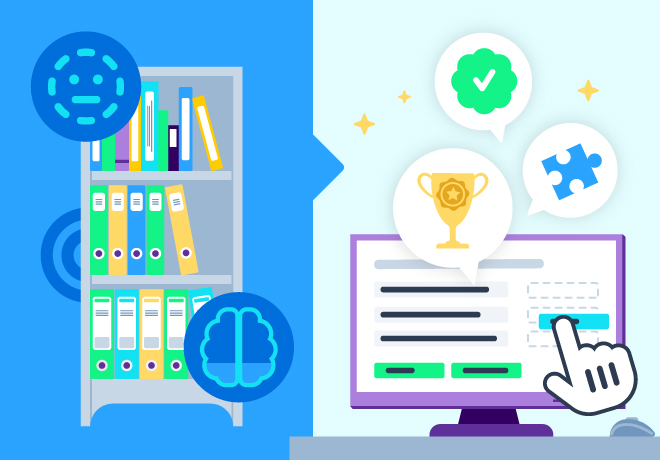
How to choose the right learning consultant for your training program

Related articles
Get valuable eLearning insights to your inbox.
Listen to Neovation’s Demystifying eLearning podcast generated with NotebookLM!
Listen to our podcast on your favorite platform!
Creating your employee training program represents an enormous investment in the future of your organization and your learners. Before taking this step, it’s wise to consult with an expert: a learning consultant.
What does a learning consultant do?
The learning consultant is a training expert who can help your organization design a talent development plan — which includes training but may extend to many other tools, resources, and strategies. This person will target their recommendations to your organization’s needs, your learner population, and your specific goals. They will help you reduce training development costs and streamline internal communication. A learning consultant can even create a plan to ensure that your organizational expertise is captured and recorded in a format that all employees can easily access.
Sounds great, right? Where do you find this mythical advisor?
Look for broad adult learning expertise
Cast a broad net: Don’t limit your search to consultants working as eLearning developers or instructional designers. The best learning consultants are not (necessarily) IDs, help desk professionals or sales personnel who work for eLearning companies, though they likely have strong background in one or more of these areas.
The best learning consultants for businesses seeking to train their employees are, first and foremost, experts on adult learning and training. That’s because you want someone with a big-picture view who will think about innovative solutions.
Although you may have a solution in mind — whether you’re leaning toward conventional classroom training, eLearning courses, microlearning, or something else — at least be prepared to entertain the idea that you don’t know the right solution yet. You need a learning consultant whose expertise extends to a broad variety of adult learning formats, media, and platforms. If they are expert only in virtual classroom training or only in mobile learning, for example, they may steer you toward that solution when a different approach, or a blend of strategies, would be more effective.
Mix in deep knowledge of data & analytics

Data-driven decision-making is all the rage — and for good reason! Many types of data come into play when planning, implementing, and evaluating a training program. Your learning consultant must be fluent with data and analytics that enable them to understand your business and training needs. These are primarily:
- Learning analytics, ranging from how to effectively assess whether your employees are actually retaining their training; these are the key to figuring out where your knowledge and skills gaps are so that you can effectively target your training
- KPIs, or key performance indicators; these are different for each organization and enable you to correlate training with changes in the business results that matter most to your organization
To help your learning consultant form opinions and create a strategic plan for your training program, they will likely use various assessments such as a training needs assessment or learning analysis, knowledge checks, or performing a training audit of your existing eLearning program.
After their planning is complete, they may turn to other methods to gather information or convey ideas, such as interviewing your subject matter experts or creating eLearning storyboards.
Layer on technical knowledge
Your learning consultant might make costly recommendations for eLearning tools, learning ecosystem components, and a training strategy that will influence your organization’s development for several years. That’s a big responsibility!
You need a learning consultant who has broad and deep knowledge of learning platforms and technologies — beyond knowing what an LMS does and why. Choose a learning consultant with a deep understanding of how all of the parts of your learning ecosystem work together.
That means understanding the technology of the LMS as well as other ecosystem components like an LXP, knowing what SCORM and xAPI are and how they can work for your organization, and how your eLearning platforms could integrate with your HRIS, your talent management system, your existing content library … and so much more.
Ask your learning consultant the right questions — before hiring
Use the same due diligence you’d use in hiring any consultant or professional — seek recommendations from trusted peers, and find out what other clients the consultant or company has provided learning consultancy services for. When interviewing consultants, ask them:
- How do they ensure that their recommendations are comprehensive? — Ask potential learning consultants how they keep current on the myriad platform options in the market, for example, and how they select the platforms that they recommend.
- Ask whether they have experience creating and using online training on a variety of platforms, using a range of media, and working with multiple LMS and LXP platforms and authoring tools, and which ones.
- Ask them about their past project management experience. Essentially, creating or updating your training strategy is a large project that requires a leader with the vision and drive to make it come to fruition. Between managing expectations of multiple stakeholders, judging timelines, and balancing budgets allocated to planning, producing, and deploying your training program, your learning consultant requires highly-developed organizational skills.
Organizational fit

There’s no magic formula to determine organizational fit. But this might be one of the most important aspects to consider when hiring a consultant or company for learning and development. Some exercises you can conduct with potential candidates are:
- Have them respond to a sample scenario — raise a training strategy question you’ve addressed in the past and ask them to outline their approach to solving it.
- Give them a small segment of your existing training program and ask them where they see areas for improvement.
- Ask them what sort of goals they might set if they took on the role of learning consultant for your organization — what would they hope to achieve within a specific time period, such as six months, a year, or longer.
Above all, think big!
Hiring a learning consultant as part of a custom instructional design service is a sign that you are ready to move your organization’s training strategy to the next level. The end result could be recommendations on a few eLearning courses, but that’s unlikely. Your learning consultant can guide you to choosing and implementing a highly effective online training ecosystem that will serve your learners for years, including advising on choosing platforms and tools and staffing your learning and development team.
You’ll want to consider all of your learning platform options before choosing the products that best meet your needs and goals. That’s why your learning consultant should be able to expertly guide you through writing RFIs and RPFs as well as help you analyze the proposals that result. If your consultant is also a vendor, decide whether you will allow their company to submit a proposal and how to ensure a neutral RFP.
Working with a learning consultant is a positive step toward a more mature learning culture and a more effective training strategy. Your organization will reap the benefits well into the future. Choose wisely, and think big!
Become part of our L&D community
We publish a new learning hub article — full of useful, practical topics — weekly.
Not sure where where you want to start? Jump into one of our recently published articles and see where it takes you!








-svg.svg)
-svg.svg)
-svg.svg)
-svg.svg)